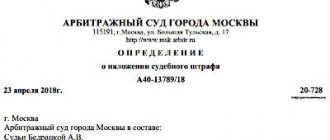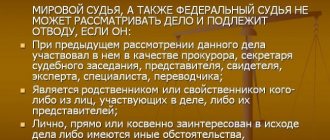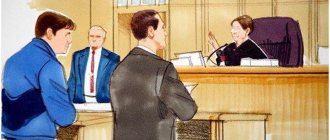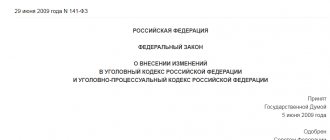The procedural laws of Russia proclaim such a principle of legal proceedings as the immutability of the composition of the court. This means that the judge who began hearing the case makes the final decision on it. Replacement occurs only in exceptional cases. For example, in accordance with Art. 18 of the Arbitration Procedural Code of the Russian Federation, it can occur when a judge is ill for a long time, died, his powers were suspended or he resigned. Similar rules for replacing judges are provided for in civil, criminal and administrative proceedings.
But what if the participants in the proceedings do not agree with the actions of the judge and demand that he be replaced - is this possible? Yes, it's possible. One of the most important tools for ensuring judicial impartiality and independence when considering cases is the institution of recusal of a judge. How to use it is described in detail in this article.
Retraction - what is it?
The right to challenge a judge was provided for in the laws of Ancient Rome. The term “recusal” implies the inability of a judge to participate in proceedings in a particular case due to certain reasons, which entails the removal of the judge from the proceedings. The particular importance of recusal as an instrument of legal judging is manifested in its accessibility to citizens. After all, any party to the case can challenge a judge, and no special legal training is required for this.
The possibility of withdrawal is provided:
- in civil proceedings - Article 16 of the Code of Civil Procedure of the Russian Federation, which states that it is impossible for a judge to participate in the proceedings if in the same dispute he has previously been a prosecutor, court secretary, representative, witness, expert, specialist or translator, and has also already participated as judges in other instances; is a relative of one of the persons participating in the dispute.
In 2013, changes were made to this article regarding extra-procedural communication between a judge and someone involved in the proceedings. Part 3 of Art. 16 of the RF PC provides that such communication without additional data about the judge’s interest does not entail his recusal. In other words, if you saw the judge and the defendant discussing something during a break, this fact in itself does not entail removal, since more compelling grounds for bias in the judging are needed.
- in the arbitration process - Article 21 of the Arbitration Procedure Code of the Russian Federation, according to which the judge cannot take part in the proceedings again (for example, if he has already considered the case as an arbitrator or was a secretary, representative, expert, etc.). As in civil procedural law, he has no right to consider a case if he is a relative of any of the participants or representatives. Additionally, in accordance with Art. 21 of the Arbitration Procedure Code of the Russian Federation excludes the possibility of conducting the process in the event that the judge was previously or is currently in official dependence on any of the participants.
Example No. 1 . Judge of the Arbitration Court of the Altai Territory Ivanov I.I. does not have the right to take part in the proceedings of a dispute between two LLCs, the founder of one of them is a former judge of the same arbitration court. When this founder worked in arbitration, Ivanov I.I. worked as an assistant and was directly subordinate to him.
Another point of the above article of the Arbitration Procedure Code of the Russian Federation seems interesting - a judge is prohibited from considering a case if he has given a public assessment of the merits of the dispute or made any statements on it.
For example, such cases include giving an interview to assess the validity of the claims made by the plaintiff, discussing or reporting the situation to a panel of judges expressing one’s own opinion on the outcome of the proceedings, etc.
An evaluative statement on the part of the arbitration judge directly during the hearing is also unacceptable.
- in criminal proceedings - Article 61 of the Code of Criminal Procedure of the Russian Federation, according to which a judge does not have the right to consider a criminal case if he is or was a victim, a civil plaintiff, a witness in it, and also if he previously took part in the investigation in the same case as an expert, specialist, investigator, representative of the victim or suspect. By analogy with other branches of law, the participation of a judge is excluded if he has previously considered the same case (for example, when the verdict was overturned by a higher authority and the materials were sent to the same court for a rehearing), and is also a relative of one of the participants .
As in civil procedural law, the legislator provided that extra-procedural communication with someone involved in the case is not grounds for disqualifying a judge in itself.
For example, if a judge and a defense attorney discuss organizational issues - how to contact a particular witness or expert that became known during the trial, this does not mean that the court took the side of the defendant and is biased.
- in the administrative process - Article 31 of the Code of Administrative Proceedings of the Russian Federation, according to which the requirements for the impartiality of a judge are similar to those listed in the Civil Procedure Code, the Arbitration Procedure Code, and the Code of Criminal Procedure of the Russian Federation. Additionally, the legislator explained that when considering claims for compensation in accordance with the CAS RF procedure, the judge who previously considered the case and made the decision that became the basis for such claims is subject to challenge. There are similar rules in civil and arbitration legislation, but in special parts of the codes, outside the general provisions on challenges.
In other words, the judge does not have the right to consider the claims of Sidorov A.A. on compensation for material and moral damage arising as a result of the actions of state bodies, if he previously made a decision on the illegality of such actions in relation to the same A.A. Sidorov.
In addition, in part 2 of Art. 31 of the CAS RF states that doubts about the objectivity and impartiality of the court are inadmissible. If there are any, there are grounds for removing the judge from considering the case.
In all of the listed procedural norms, there is one more circumstance that is unconditional for the challenge of a judge: the presence of information about his interest in the outcome of the case. This basis most often appears in applications for the recusal of judges. Interest can be obvious, personal, direct or indirect - in all of these cases, the judge is obliged to remove himself or satisfy requests for removal received from other persons.
Reasons
A judge is removed from a case only if there are good reasons. This is usually due to the fact that the citizen is interested in the results of the case, as well as if there are doubts about his impartiality.
The reasons can be objective or conditional. Objective ones include :
- the judge had previously considered this case, so the law prohibits repeated participation, but this does not include revised cases;
- the specialist has already participated in the study of this case, but in a different status, for example, worked as an investigator, prosecutor or lawyer;
- the presence of family ties with any participant in the process or the prosecutor acting as prosecutor is revealed, therefore self-recusal is necessary, otherwise the court decision may be canceled.
It is quite simple to confirm objective grounds, so the applicant must have official evidence. Difficulties arise only in the presence of conditional grounds, which are difficult to prove because they are based on a subjective assessment. These include the judge’s interest in the results of the case, and it can be not only direct, but also indirect. If it is established that it is indeed beneficial for a person to resolve the dispute, then a challenge is carried out.
To confirm personal interest, it is established whether the judge communicates with any participant in the process outside of court hearings. These persons may be relatives, acquaintances or friends. Often the accused or prosecutor is the organization in which a relative of the judge works. Sometimes the specialist even agrees with any participant to receive a monetary reward for the desired solution.
Reference! If the application is denied because evidence has not been presented, the participant cannot resubmit the application.
How to file a challenge
As a general rule, a petition (statement) for recusal can be made at the stage when the composition of the court is announced .
If the case is considered by a jury, then a lack of confidence can be declared before the formation of the jury. For example, before the start of a criminal trial, the judge, having established the identity of the defendant and the victim, announces who is hearing the case: he states his name, as well as the name of the secretary, state prosecutor and defense attorney. After which the right of challenge is explained and the presiding officer asks the participants whether they trust such a composition. At this moment, the plaintiff, defendant, representatives, lawyers, prosecutor, victim or defendant can stand up (the court’s questions are answered standing) and make a statement of no confidence, that is, a challenge.
Please note that a witness, expert or specialist does not have the right to make such requests, like any other.
At this same stage, the judge has the right to recuse himself - for example, to declare his family connection with the representative of the defendant in the case and decide on his removal.
The law allows you to declare a lack of confidence at other stages of the proceedings if doubts about impartiality arose later, after the start of the hearing.
Question: Is it necessary to declare a challenge in writing?
There are no rules about the need for written form, because everything that is spoken during the proceedings is entered into the protocol of the court session. However, we would recommend that such important statements be made in writing. From a written petition, the grounds and motives are clearly understood, and the reference to certain circumstances is better perceived visually than by hearing. In addition, the written document will necessarily be attached to the case materials, and if the dispute is considered by higher authorities, it may promptly “remind” the appellate panel of judges of the lack of confidence in the composition of the first instance. The law does not require the provision of a copy of the petition to other participants in the process; this issue is resolved at the discretion of the applicant.
Rules for drawing up a document
If a citizen has evidence for a legal challenge, then a written petition is formed, although oral appeals are allowed. It is advisable to compose a text that reflects the identified grounds.
Although there is no unified form, the following data must be included:
- personal data of the applicant, provided by his full name and residential address;
- details and name of the case;
- grounds for challenge, which must be motivated;
- links to evidence and legal requirements;
- request to remove the judge from the proceedings;
- date of preparation and signature of the applicant.
Important! Documents confirming the reasons are attached to the application. There is no requirement to pay any fee, and there are no negative consequences for the citizen if the application is rejected.
Sample applications for disqualification of a judge
We have compiled several samples for use in different areas of law, for different reasons:
In civil proceedings
To the Krasnoberezhny District Court of Rostov-on-Don, Judge E.V. Pichugina. from the plaintiff N.N. Peredvizhkin, residing at Rostov-on-Don, st. Lesnaya, 10, apt. 9, tel. 8939393
representative of the plaintiff: V.S. Palkin, acting under power of attorney dated 02/02/2019
defendant: Malov K.E., residing at Rostov-on-Don, st. Krasnova, 788, tel. 89999999
Case No. 25525/2019 on the claim of N.N. Peredvizhkin to Palkin V.S. on the collection of the amount and interest for use in the total amount of 590,000 rubles
STATEMENT on recusal of a judge
Your proceedings include civil case No. 25525/2019 based on the claim of N.N. Peredvizhkin. to Palkin V.S. on the collection of the amount and interest for use in the total amount of 590,000 rubles, a preliminary hearing is scheduled for 06/21/2019.
Currently, the plaintiff Peredvizhkin N.N. it became known about your indirect interest in the outcome of this civil dispute. So, your daughter Pichugina E.V. is subordinate to gr. Malov E.K., working as director of the municipal unitary enterprise "Vesna". This circumstance gives reason to believe that you do not have the right to consider case No. 25525/2019 due to the impossibility of making an objective and impartial decision.
In accordance with clause 3, part 1, art. 16 of the Code of Civil Procedure of the Russian Federation, a judge does not have the right to consider a case and is subject to recusal if there are circumstances that raise doubts about his objectivity and impartiality.
Using the right granted to me by Art. 19 of the Code of Civil Procedure of the Russian Federation, I declare a recusal from the consideration of civil case No. 25525/2019 to you, that is, to the judge of the Krasnoberezhny District Court of Rostov-on-Don E.V. Pichugina.
Representative of the plaintiff: Malov K.E. (power of attorney in the case). signature 02/21/2019
In the arbitration process
To the Arbitration Court of the Nizhny Novgorod Region
Applicant: plaintiff, individual entrepreneur Zakharov N.N., born on December 14, 1988, native of Nizhny Novgorod, date and place of registration as an individual entrepreneur, No. Unified State Register of Individual Entrepreneurs, email, telephone
Representative of the plaintiff: Konovalov M.S., acting on the basis of agreement No. 21 dated 06/02/2019 Address, email, telephone
Case No. 27272/19 according to the claim of IP Zakharov N.N. to IP Petrov K.T. on reclaiming property and terminating the lease agreement
APPLICATION FOR CHALLENGE OF A JUDGE
In the proceedings of the judge of the Arbitration Court of the Nizhny Novgorod Region, A.P. Mironov. There is case No. 2772/19 on the claim of IP Zakharov N.N. to IP Petrov K.T. on reclaiming property and terminating the lease agreement. The said judge does not have the right to consider this case on the basis of clause 6, part 1, art. 21 Arbitration Procedure Code of the Russian Federation.
Thus, according to this norm of arbitration legislation, the participation of a judge in the process is excluded if he was previously in official or other dependence on a participant in the dispute or his representative.
As follows from the case materials, the representative of the defendant Petrov K.T. is lawyer Afonasyev A.T., who until 2021 was the chairman of the Arbitration Court of the Nizhny Novgorod Region, and at the same time Mironov A.P. was and continues to be an arbitration judge of the same court.
Since, in violation of Art. 24 Arbitration Procedure Code of the Russian Federation, Mironov A.P. self-recusal was not declared on the basis of Art. Art. 21-26 of the Arbitration Procedure Code of the Russian Federation, I challenge Judge A.P. Mironov. and I ask you to transfer case No. 2772/19 according to the claim of IP Zakharov N.N. to IP Petrov K.T. to another judge of the Arbitration Court of the Nizhny Novgorod Region.
Representative of the plaintiff Konovalov M.S., 02/12/2019, signature
Appendix: screenshot from the official website of the Arbitration Court of the Nizhny Novgorod Region indicating the chairmen from 2010 to 2017.
In criminal proceedings
To the Leninsky District Court of Volgograd, Judge A.A. Nikitin.
victim Mitrofanov A.A., living in Volgograd, st. Zheleznaya, 20, tel. 899393
in a criminal case against Ryabov A.P., accused of committing a crime under Part 4 of Art. 159 of the Criminal Code of the Russian Federation
STATEMENT on recusal of a judge
There is a criminal case under investigation against A.P. Ryabov. in committing a crime under Part 4 of Art. 159 of the Criminal Code of the Russian Federation, according to which I am a victim.
In accordance with the requirements of Art. 63 of the Code of Criminal Procedure of the Russian Federation on the inadmissibility of repeated participation, you do not have the right to consider this case, since it was sent for a new consideration after an appeal, where you took part and were on a panel of three judges.
Based on Art. 64 of the Code of Criminal Procedure of the Russian Federation, I declare to you, judge of the Leninsky District Court of Volgograd Nikitin A.A. challenge and request that the above criminal case be transferred to another judge of the same court.
Victim A.A. Mitrofanov, 02/09/2019, signature
Appendix: copy of the appeal ruling of the judicial panel for criminal cases of the Volgograd Regional Court dated 06/03/2019 on the cancellation of the sentence against A.P. Ryabov. and sending the case for a new trial to the Leninsky District Court of Volgograd in a different composition.
In the administrative process
To the Samokhinsky District Court of Dzerzhinsk to Judge G.N. Morozov.
from the administrative plaintiff Laptev I.A., living in Dzerzhinsk, st. Rodnikovaya, 10 tel. 89393900
in case No. 1222/2019 on the administrative claim of Laptev I.A. on the collection of compensation from the Federal Bailiff Service for the city of Dzerzhinsk due to the recognition of the actions of the bailiff as illegal
STATEMENT on recusal of a judge
Your proceedings include case No. 1222/2019 regarding the administrative claim of I.A. Laptev. to the Federal Bailiff Service for the city of Dzerzhinsk for the recovery of compensation due to the recognition of the actions of the bailiff as illegal.
In accordance with the requirements of Part 3 of Art. 31 of the Code of Arbitration Code of the Russian Federation, an administrative case on the award of compensation cannot be considered by a judge if he has previously taken part in the consideration of the case in connection with which the grounds for awarding compensation arose.
In the present case, administrative claims for the award of compensation arose as a result of the recognition of the actions of the bailiff of the Federal Bailiff Service for the city of Dzerzhinsk as illegal, violating the right of Laptev A.I. to reasonable legal proceedings. The decision to recognize the actions of the FSSP bailiff K.K. Petrov was rendered on 03/01/2019 by the judge of the Samokhinsky District Court of Dzerzhinsk G.N. Morozov.
In this regard, you do not have the right to take part in the consideration of the administrative claim of Laptev I.A. to the Federal Bailiff Service for the city of Dzerzhinsk, on case 1222/2019. Based on Art. Art. 31, 34, 35, 36 CAS of the Russian Federation, I declare to you, Judge G.N. Morozov. challenge and request that case No. 122/2019 be transferred to another judge.
Administrative plaintiff Laptev I.A., 01/29/2019, signature
Appendix: copy of the decision of the Samokhinsky District Court of Dzerzhinsk dated 03/01/2019.
As can be seen from the samples presented, there are no strict requirements for the format and content of the petition (application). As a general rule, it should be clear from the text to whom the petition is addressed, as well as:
- for what case and who is applying (indicating the status, full name, case number and the essence of the dispute/accusation);
- motivation for the application - with reference to the norm of procedural law and indicating the factual circumstance that became the basis for mistrust;
- supporting evidence and, if necessary, an attachment with copies of documents (for example, a copy of a previous decision);
- number, signature.
Please note that a request for recusal is always addressed to the same judge in respect of whom the question of disqualification is raised (except for arbitration - here the application is written to the chairman of the court or simply to the court, without indicating the full name).
Application resolution procedure
Typically, an application for challenge is resolved at a court hearing by the same judge who is presiding over the proceedings alone. This provision, enshrined in the norms of procedural law (for example, part 4 of Article 65 of the Code of Criminal Procedure of the Russian Federation in criminal cases), is criticized by a number of legal experts. In their opinion, it would be more correct to resolve statements of this nature by other judges. At the same time, in the presence of requirements of the Civil Procedure Code, Code of Criminal Procedure, CAS of the Russian Federation on the unchanged composition of the court when considering a case, in modern procedural legislation the resolution of individual petitions by other judges is impossible and is not provided for.
The exceptions are:
- challenges submitted to judges of an arbitration court, individually or collectively considering a dispute - such applications are resolved by the chairman of the arbitration court, his deputy or the chairman of the panel (which is why in the sample presented above, the application is addressed not to a specific judge, but to the arbitration court as a whole);
- cases in which legal proceedings are conducted by a panel of judges (as a rule, there are three of them) and when a challenge is declared to one of them. Then the petition is considered by the remaining judges in the absence of the third. If no confidence is expressed to the entire board as a whole, the decision is made by voting according to the majority principle.
After a motion to challenge has been filed, the opinions of the persons participating in the case are heard, after which the judge is obliged to retire to the deliberation room and, upon returning, announce the ruling:
- on refusal to satisfy the petition (when there are no grounds for dismissal, in which case the hearing continues);
- to satisfy the petition and remove oneself from the consideration of the case (in this case, the hearing is terminated and will begin again by another presiding officer after the materials are transferred to him).
Upon a petition to disqualify a judge in a criminal trial, the opinions of the victim, the defendant, their representatives, the defense attorney and the prosecutor are heard. In arbitration and civil proceedings, opinions are expressed by the plaintiff, defendant, their representatives, as well as third parties filing independent claims. Other persons (witnesses, experts, session secretaries) do not speak out. The discussion of self-recusal, declared by the judge himself on his own initiative, occurs in a similar way. Please note that discussion takes place only with the participation of those present.
Example No. 2 . The defendants appeared in the arbitration process, but the plaintiffs did not. If a judge is challenged, the procedure for resolving it, provided for by the arbitration procedural code, does not imply a delay in calling the plaintiffs to hear their opinion. Discussion of the petition takes place only with those who are directly present at the meeting here and now.
The determination based on the results of consideration of the statement of no confidence is not appealed separately. If a party to a dispute does not agree with the result, he has the right to draw the attention of a higher authority to this in his appeal, indicating in it violations of procedural legislation on recusal, along with other arguments.
Question: Is it possible to file a motion for recusal again?
No, if it is about distrust of the same person and for the same reasons.
Example No. 3 . At the beginning of the meeting, the defendant declared no confidence in the presiding officer due to his interest - the applicant believed that he had already formed a decision in favor of the plaintiff and, thus, was biased. After hearing the parties, the judge retired to the deliberation room and denied the petition. Subsequently, at the end of the proceedings, after questioning all the witnesses, the defendant again filed the same motion, again alleging interest and bias. The repeated application was not considered, as it was made for the same reasons and in relation to the same presiding officer.
During legal proceedings, challenges may be filed not only to the judge. As a general rule, if a challenge is also filed against other persons (for example, a prosecutor), then the issue of lack of confidence in the judiciary is considered first, and only secondarily – issues of lack of confidence in the rest.
If the request is granted, the case is transferred to another judge working in the same court. For example, if district judge Petrov I.I. a challenge was filed and it was granted, the chairman of the court transfers the case to another judge A.A. Repin. From this moment, Repin accepts the case for his proceedings, schedules a court hearing and the hearing takes place all over again, even if many witnesses have already been questioned earlier in previous trials. Eyewitnesses will be interrogated again, case materials will be examined again, etc.
Question: How is a magistrate replaced if a motion for no confidence is granted? After all, the magistrate is the only representative of justice in his territorial area, and it turns out there is no one to transfer the case to.
In such cases, by order of the chairman of the district court, the case is transferred to the magistrate of another territorial district, taking into account the workload and interchange schedule. In exceptional cases, materials may be transferred to another district if replacing the judge is impossible.
Arbitrage practice
In practice, many appeals submitted by participants in the trial are not satisfied. Usually the reason is a lack of evidence or the use of a subjective assessment.
An example is the following situation:
- a citizen complained about the actions of employees of the regional administration, filing a claim in a court of general jurisdiction in the city of Petropavlovsk-Kachastsky;
- the judge postponed the hearing for one month at the request of a representative of the local administration;
- before the start of the trial, the plaintiff’s lawyer filed an appeal to challenge the judge;
- the statement indicated that the plaintiff had doubts about the impartiality of the specialist, but there was no evidence;
- a negative decision was made on this petition, since there was no documentary evidence to support the plaintiff’s words.
Attention! Although the challenge is carried out before the consideration of the case materials, if during the proceedings the participants have new information about the judge, then they have the right to submit an application at any time. It is formed in writing, and the received evidence is also attached to it.









